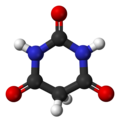Barbituric acid
Barbituric acid is an organic compound that is the parent structure for a variety of barbiturates, which are widely used as sedative and anesthetic drugs. The structure of barbituric acid is based on a pyrimidine ring, which is a six-membered ring with two nitrogen atoms and four carbon atoms. The name "barbituric acid" comes from the fact that it was first synthesized on Saint Barbara's Day in 1864 by German chemist Adolf von Baeyer.
History[edit]
Barbituric acid was first synthesized on December 4, 1864, by Adolf von Baeyer. This was done by condensing urea (an animal waste product) with diethyl malonate (an ester derived from the natural substance malonic acid). The reaction created a substance that was crystalline, slightly acidic, and was named barbituric acid in honor of Saint Barbara, the patron saint of architecture and fireworks, as well as the name of Baeyer's friend Barbara.
Structure and properties[edit]
Barbituric acid is a six-membered heterocyclic compound with two nitrogen atoms and four carbon atoms in the ring. It is a white crystalline substance that is slightly soluble in water and freely soluble in hot water. It is also soluble in alcohol and slightly soluble in ether.
The structure of barbituric acid is the basis for the structure of barbiturates, a class of drugs that act as central nervous system depressants. Barbiturates are derived from barbituric acid by substitution of one or more of the hydrogen atoms by alkyl, alkenyl or aryl groups.
Synthesis[edit]
Barbituric acid can be synthesized by the reaction of malonic acid with urea in the presence of phosphorus oxychloride (POCl3) as a catalyst. The reaction proceeds via a condensation reaction, with the elimination of a molecule of water.
Uses[edit]
While barbituric acid itself is not used clinically, its derivatives, known as barbiturates, have been widely used as sedative and anesthetic drugs. Barbiturates have largely been replaced by safer drugs, although some are still in use for specific purposes.
See also[edit]
Barbituric acid gallery[edit]
-
Barbituric acid structural formula
-
Barbituric acid 3D ball model
-
Barbituric acid synthesis
-
Barbituric acid, acid reaction
Ad. Transform your life with W8MD's Budget GLP-1 injections from $75


W8MD offers a medical weight loss program to lose weight in Philadelphia. Our physician-supervised medical weight loss provides:
- Weight loss injections in NYC (generic and brand names):
- Zepbound / Mounjaro, Wegovy / Ozempic, Saxenda
- Most insurances accepted or discounted self-pay rates. We will obtain insurance prior authorizations if needed.
- Generic GLP1 weight loss injections from $75 for the starting dose.
- Also offer prescription weight loss medications including Phentermine, Qsymia, Diethylpropion, Contrave etc.
NYC weight loss doctor appointmentsNYC weight loss doctor appointments
Start your NYC weight loss journey today at our NYC medical weight loss and Philadelphia medical weight loss clinics.
- Call 718-946-5500 to lose weight in NYC or for medical weight loss in Philadelphia 215-676-2334.
- Tags:NYC medical weight loss, Philadelphia lose weight Zepbound NYC, Budget GLP1 weight loss injections, Wegovy Philadelphia, Wegovy NYC, Philadelphia medical weight loss, Brookly weight loss and Wegovy NYC
|
WikiMD's Wellness Encyclopedia |
| Let Food Be Thy Medicine Medicine Thy Food - Hippocrates |
Medical Disclaimer: WikiMD is not a substitute for professional medical advice. The information on WikiMD is provided as an information resource only, may be incorrect, outdated or misleading, and is not to be used or relied on for any diagnostic or treatment purposes. Please consult your health care provider before making any healthcare decisions or for guidance about a specific medical condition. WikiMD expressly disclaims responsibility, and shall have no liability, for any damages, loss, injury, or liability whatsoever suffered as a result of your reliance on the information contained in this site. By visiting this site you agree to the foregoing terms and conditions, which may from time to time be changed or supplemented by WikiMD. If you do not agree to the foregoing terms and conditions, you should not enter or use this site. See full disclaimer.
Credits:Most images are courtesy of Wikimedia commons, and templates, categories Wikipedia, licensed under CC BY SA or similar.
Translate this page: - East Asian
中文,
日本,
한국어,
South Asian
हिन्दी,
தமிழ்,
తెలుగు,
Urdu,
ಕನ್ನಡ,
Southeast Asian
Indonesian,
Vietnamese,
Thai,
မြန်မာဘာသာ,
বাংলা
European
español,
Deutsch,
français,
Greek,
português do Brasil,
polski,
română,
русский,
Nederlands,
norsk,
svenska,
suomi,
Italian
Middle Eastern & African
عربى,
Turkish,
Persian,
Hebrew,
Afrikaans,
isiZulu,
Kiswahili,
Other
Bulgarian,
Hungarian,
Czech,
Swedish,
മലയാളം,
मराठी,
ਪੰਜਾਬੀ,
ગુજરાતી,
Portuguese,
Ukrainian


